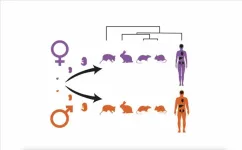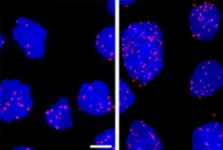(Press-News.org) Francis Crick Institute press release
Under strict embargo: 18:00hrs GMT Thursday 2 November 2023
Peer reviewed
Observational study
People and animals
Researchers at the Francis Crick Institute and Heidelberg University in Germany have shown that sex differences in animals vary dramatically across species, organs and developmental stages, and evolve quickly at the gene level but slowly at the cell type level.
Mammals have different traits depending on sex, like antlers in male deer. These are known as ‘sexually dimorphic’ traits, and include differences which aren’t visible, such as in internal organs. However, researchers didn’t know when and where sex differences emerge, and which genes and cells are responsible for them.
In this study, published today in Science, the researchers analysed the activity of genes in males and females over time in humans and four species (mice, rats, rabbits, opossums and chickens), covering the development of five organs (brain, cerebellum, heart, kidney and liver), into adulthood in the animals and up to birth in humans1.
The researchers discovered that the organs which are different between the sexes vary across species. For example, the liver and the kidney were the most sexually dimorphic in rats and mice, whereas in rabbits, the heart was the most sexually dimorphic and liver and kidney not at all.
The researchers also found that, in all animals and humans, few sex differences occurred while organs were developing. Instead, they increased sharply around sexual maturity.
The researchers then investigated the genes responsible for sex differences, finding that different genes are ‘sex-biased’ (expressed differently depending on sex) across species. Only a very small number of sex-biased genes were shared across species, suggesting that sex differences have evolved quickly. The few genes that were shared were usually located on the sex (X and Y) chromosomes.
Although sex-biased genes differed between species, the study showed that the types of cells that are sexually dimorphic are the same across species. For example, in mice and rats, different genes were sex biased in the liver, but, in both cases, the sex-biased genes were active in the hepatocytes, the main type of cell in the liver. This may explain why there are sex differences in drug processing in the liver.
Leticia Rodríguez-Montes, PhD student at Heidelberg University, and first author, said: “It was interesting to see that despite the fast evolution of sex differences, a few genes located on the X and Y sex chromosomes showed differences between the sexes in all mammalian species. These probably serve as basic genetic triggers for the development of traits specific to each sex in all mammals.”
Margarida Cardoso Moreira, Group Leader of the Evolutionary Developmental Biology Laboratory at the Crick, and co-leader of the study with Henrik Kaessmann at Heidelberg University, said: “By taking an evolutionary approach, we’ve observed that sex differences evolve fast at the gene level but slowly at the cell level. This has implications for how we use animal models to understand sex differences in humans, as it’s helpful to know that a particular cell type is sexually dimorphic across species, even if there are other differences.
“It was also surprising to us that there are so few sex differences until sexual maturity. We were expecting most differences to occur in adults because this is when sex differences are most visible, but we also expected to see a gradual increase in sex differences during organ development, instead of an abrupt rise around sexual maturity. This research is another piece in the puzzle of understanding why we are sexually dimorphic and how this impacts us.”
-ENDS-
For further information, contact: press@crick.ac.uk or +44 (0)20 3796 5252
Notes to Editors
Reference: Rodríguez-Montes, L. et al. (2023) Sex-biased gene expression across mammalian organ development and evolution. Science. 10.1126/science.adf1046
1. A different approach was used for humans, as the available data only goes up to shortly after birth. The researchers looked at sex-biased genes until shortly after birth, and then checked if these same genes continued to show sex differences in adults using a public resource (the GTEx resource). This means the list of sex-biased genes in humans only included genes showing differences before or just after birth, whereas in the animals, it included sex-biased genes at any stage of development.
The Francis Crick Institute is a biomedical discovery institute dedicated to understanding the fundamental biology underlying health and disease. Its work is helping to understand why disease develops and to translate discoveries into new ways to prevent, diagnose and treat illnesses such as cancer, heart disease, stroke, infections, and neurodegenerative diseases.
An independent organisation, its founding partners are the Medical Research Council (MRC), Cancer Research UK, Wellcome, UCL (University College London), Imperial College London and King’s College London.
The Crick was formed in 2015, and in 2016 it moved into a brand new state-of-the-art building in central London which brings together 1500 scientists and support staff working collaboratively across disciplines, making it the biggest biomedical research facility under a single roof in Europe.
http://crick.ac.uk/
END
A team of researchers from UCLA has unveiled a first-of-its-kind stable and fully solid-state thermal transistor that uses an electric field to control a semiconductor device’s heat movement.
The group’s study, which will be published in the Nov. 3 issue of Science, details how the device works and its potential applications. With top speed and performance, the transistor could open new frontiers in heat management of computer chips through an atomic-level design and molecular engineering. The advance could also further the understanding of how heat is regulated in the human body.
“The precision control of how heat flows through materials has been a long-held ...
Americans who have a tooth pulled or another painful dental procedure in the United States today are far less likely to get opioid painkillers than they were just a few years ago, a new study shows.
That’s good news, since research shows that opioids are not necessary for most dental procedures.
But the COVID-19 pandemic seems to have thrown a wrench into the effort to reduce opioid use in dental care – and not just in the few months after dentists and oral surgeons started providing routine care again after a pause in spring 2020.
The decline in opioid prescriptions filled by dental patients was much faster in the pre-pandemic ...
Francis Crick Institute press release
Under strict embargo: 18:00hrs GMT Thursday 2 November 2023
Peer reviewed
Experimental study
Animals
Researchers at the Francis Crick Institute and the Université Cote d’Azur, together with other labs in France and Switzerland, have identified a gene which is an early determining factor of ovary development in mice.
Typically, mice with XY sex chromosomes develop testes, and mice with XX chromosomes develop ovaries. Whether early gonads become ovaries or testes is due to cells either ...
The development of sex-specific characteristics is frequently seen in mammals. These characteristics stem from the activation of corresponding genetic programmes that until now have been largely undescribed by the scientific community. An international research team from the Center for Molecular Biology of Heidelberg University and The Francis Crick Institute in London has, for the first time, decoded the programmes that control the sex-specific development of major organs in selected mammals – humans, mice, rats, rabbits, and opossums. By comparing these programmes, the researchers were also able to trace the ...
Researchers led by Professor KANG Kisuk of the Center for Nanoparticle Research within the Institute for Basic Science (IBS), have announced a major breakthrough in the field of next-generation solid-state batteries. It is believed that their new findings will enable the creation of batteries based on a novel chloride-based solid electrolyte that exhibits exceptional ionic conductivity.
A pressing concern with current commercial batteries their reliance on liquid electrolytes, which leads to flammability ...
New observations down to light-year scale of the gas flows around a supermassive black hole have successfully detected dense gas inflows and shown that only a small portion (about 3 percent) of the gas flowing towards the black hole is eaten by the black hole. The remainder is ejected and recycled back into the host galaxy.
Not all of the matter which falls towards a black hole is absorbed, some of it is ejected as outflows. But the ratio of the matter that the black hole “eats,” and the amount “dropped” ...
A surprising mechanism that makes some cancers treatment-resistant has been discovered by Weill Cornell Medicine and NewYork-Presbyterian investigators. The mechanism, which involves the shuttling of messenger RNAs (mRNAs) from the nucleus to the cytoplasm, ultimately facilitates DNA repair in cancer cells. These cancer cells can thereby thwart treatments aimed at damaging their DNA.
In a project encompassing both fundamental research and clinical studies they demonstrated that a combination of approved chemotherapies, ...
One in seven people in the US reported having had long Covid by the end of 2022, suggests a large-scale investigation of long Covid and symptom prevalence by academics at UCL and Dartmouth.
Having had long Covid is associated with anxiety and low mood, as well as an increased likelihood of continued physical mobility problems and challenges with memory, concentration or understanding, according to the findings published in PLOS ONE.
The risk of anxiety and low mood appeared to be lower for those who have been vaccinated, ...
New York, NY (November 2nd, 2023) — The Mount Sinai Health System has received a $7 million grant from the Multiple Myeloma Research Foundation for a three-year project that aims to fast-track novel translational concepts to improve outcomes for people with high risk myeloma, the second most common blood cancer in the United States.
This grant award will facilitate a multidisciplinary research project that will analyze a large, diverse cohort of patient samples from all over the United States at the genomic and immune level and apply novel functional genomics technology to understand the critical events that drive ...
November 2, 2023, Mountain View, CA -- The SETI Institute is delighted to announce that Dr. Pascal Lee will be honored with the 2023 Carl Sagan Prize for Science Popularization presented by Wonderfest. The prestigious Sagan Prize recognizes and encourages individuals who “have contributed wonderfully to the public understanding and appreciation of science.” Previous recipients from the SETI Institute include SETI Institute co-founder and SETI pioneer Jill Tarter, senior astronomer Seth Shostak and trustee Andrew Fraknoi.
“I am truly delighted and humbled by this award,” says Pascal Lee, “all the more because Carl Sagan was, and remains, ...





